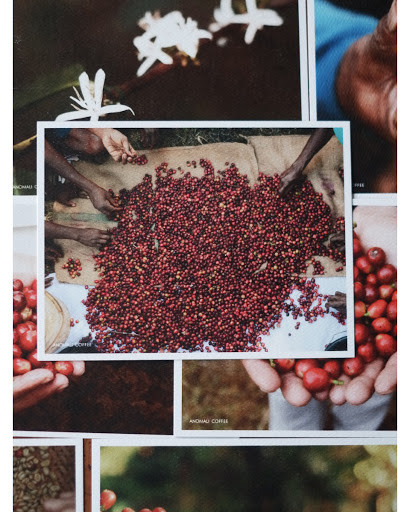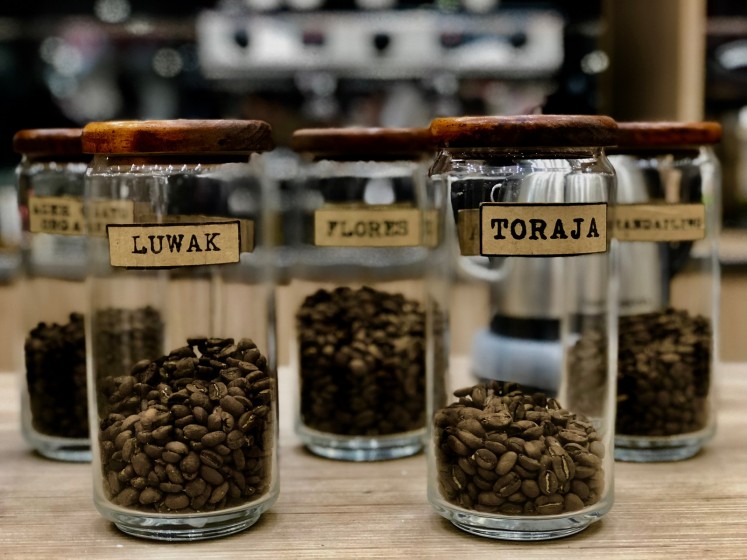Popular Reads
Top Results
Can't find what you're looking for?
View all search resultsPopular Reads
Top Results
Can't find what you're looking for?
View all search resultsIndonesia’s coffee: More than just a cuppa
Coffee permeates almost every aspect of the Indonesian lifestyle, so much so it’s become a verb, ngopi. And while it may be just a hot beverage for most consumers, the business is a long-term investment toward sustainability for both domestic and international markets.
Change text size
Gift Premium Articles
to Anyone
C
offee is one of those things you either chug religiously to fuel your morning or sip daintily while people-watching at a scenic cafe.
A coffee habit does not need to be costly, as the popularity of takeaway coffee shops attests to.
But before the iced coffee boom of recent times, Indonesia’s coffee scene was perhaps best exemplified by Anomali Coffee.
Established in 2007, Anomali Coffee is a coffee roasting company that offers beans from various regions in Indonesia. Along the way, it started to include coffee equipment, barista classes and its own cafe among its offerings.
In its “Ngupi Lestari” (sustainable coffee) webinar, Anomali Coffee co-owner Irvan Helmi, who also chairs the Sustainable Coffee Platform of Indonesia (SCOPI), said that in the early days, not many had thought about selling coffee as a long-term business.
“I went to the Sinar shop in Tanah Abang and I saw the shopkeepers were [completely] covered in coffee powder. I was in middle school or high school at that time, and I immediately took an interest to coffee,” he recalled, and that he previously thought coffee only came in sachets.
Full of beans: Postcards are some of the merchandise on offer at Anomali Coffee, an Indonesian coffee roasting company that has diversified to cover all sectors of the industry. (Courtesy of anomalicoffee.com/-)From buying coffee for his grandmother, Irvan went on to develop a love for the beans, despite majoring in computer science and having never taken any classes to do with the hospitality industry.
His first food-related was selling oxtail soup made from his grandmother’s recipe. But Irvan “got bored” and decided to take the plunge into the coffee business.
“In the coffee business, it’s like there’s never-ending knowledge to be gained, even now. Maybe that’s the key – sustainability,” he mused. “We realize that what we don’t know about is important, because then we strive to gain that knowledge, and that fueled my business decision.”
Indradi “Indi” Soemardjan, founder of Javanero and SOMA Coffee, told the webinar that he started in trade before venturing into production and on into the downstream sectors.
“At the same time, I saw that we [Indonesia] are the fourth largest producer of coffee in the world, [but] with a market share that is far lower than the top three of Brazil, Vietnam and Colombia,” said Indi.
“The top producer has 27 percent of the share, the second 11 percent, and the third nine percent. We only have seven percent overall, and 80 percent of that is Robusta beans, with [just] 15 percent Arabica. Because of this, Indonesia only produces about one percent of the world’s Arabica beans,” he said.
According to the latest available data from the International Coffee Organization, Indonesia produced 11.2 million 60-kilogram bags of coffee in 2019, compared to Colombia with 14.1 million bags, Vietnam with 30.75 million bags and Brazil with 58 million bags that same year.
Indonesian coffee beans (Shutterstock/Randu Aditara)But Indonesia’s total coffee output grew 16.5 percent year-on-year from 2018 to 2019, far above production growth for Colombia (1.7 percent), Vietnam (minus 1.7 percent) and Brazil (minus 10.9 percent).
The data might not mean much to the uninitiated, but Indi says Indonesian beans simply aren’t available in the market. Whenever he attends an international expo, the feedback is positive but the products are not there.
“Because of this, I and the people at SCOPI have been organizing and developing educational material for farmers, because we have such a low product output. I still trade [beans], but not to Anomali’s [level], because I want to focus on the collective effort,” he said.
SCOPI executive director P. Mentari Kesuma said that sustainability was not just the responsibility of businesspeople, but also ordinary members of the public.
“We consume coffee to a degree that it has become part of our daily culture, even in the regions, not just swanky cafes in metropolitan cities. However, not many realize that productivity is at risk,” she said.
According to Indi, the biggest problem was gaining consumer trust by convincing them that Indonesia’s coffee did indeed sell after roasting.
“That’s when we look outside [the country]. If we look inside, we have to be trusted by the network of farmers. Many farmers, regardless of crop output, say that they are often visited by various NGOs that only start a pilot project and then [they are] left on their own,” he said.
“The region we are helping to develop at Gunung Tilu, West Java, required at least two years until we had [built up] enough social capital. It’s not about the money, but about showing that you care.” (ste)












